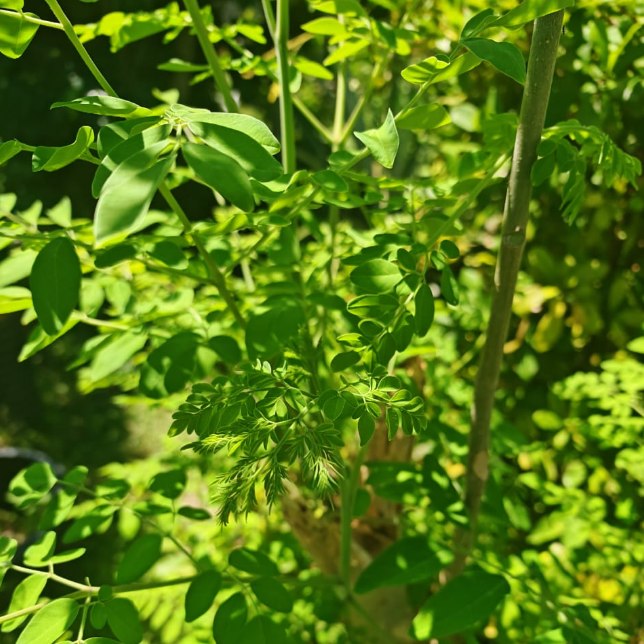
Characteristics and Functions of Moringa
Moringa oleifera
Characteristics and Functions of Moringa
Plant Description
Moringa, also known as the miracle tree, drumstick tree, and horseradish tree , is native to tropical and subtropical regions of India and Africa and is now widely cultivated in Southeast Asia and Latin America. The entire plant (leaves, seeds, flowers, roots, and bark) is usable, and the leaves are extremely nutrient-dense, making them a key plant in traditional Ayurvedic medicine.
Core health benefits
Super high nutritional value
vitamins
The vitamin C content in the leaves is ≈7 times that of citrus , and the vitamin A content is ≈4 times that of carrots . It is rich in B vitamins ( B1 , B2 , B6 ).
minerals
The calcium content is ≈ 4 times that of milk , potassium is ≈ 3 times that of banana , and iron is ≈ 3 times that of spinach . It also contains magnesium, zinc, etc.
protein
Contains 18 kinds of amino acids, including 9 essential amino acids, and the protein content is ≈2 times that of yogurt (up to 27% in dry leaves ).
antioxidants
Rich in quercetin, kaempferol, chlorogenic acid, etc., which can fight against free radical damage.
Blood sugar regulation and diabetes management
Clinical evidence : Multiple studies (such as Journal of Diabetes 2020 ) have shown that Moringa leaf powder can significantly reduce fasting blood sugar and glycated hemoglobin ( HbA1c ).
Mechanism : Isothiocyanates and chlorogenic acid enhance insulin sensitivity and slow intestinal glucose absorption.
Cardiovascular protection
Lowering cholesterol : Animal experiments have shown that Moringa leaf extract can lower serum total cholesterol and LDL (bad cholesterol) and increase HDL (good cholesterol).
Lowering blood pressure : The thiocarbamate compounds in the bark and leaves have natural ACE inhibitor effects (similar to the principle of antihypertensive drugs).
Immune enhancement and anti-inflammatory
Antibacterial and antiviral
Moringin in the seeds has an inhibitory effect on Escherichia coli, Salmonella, etc.
Anti-inflammatory activity
Isothiocyanates inhibit the NF-κB inflammatory pathway and alleviate chronic inflammatory conditions such as arthritis.
Other key roles
Liver protection
Reduce liver damage caused by toxins (confirmed by animal experiments).
Improve anemia
High iron content + vitamin C promotes iron absorption.
Promote metabolism
B vitamins support energy conversion and chlorophyll aids detoxification.
Health Benefits of Moringa
Known as the "miracle tree," Moringa oleifera is rich in vitamins, minerals, and amino acids. It's widely used in modern health products because it helps lower blood sugar, improve cardiovascular health, and boost immunity.
Fusion of traditional and modern values
Moringa is used in Indian Ayurvedic medicine to treat over 300 ailments. Modern science has validated its antioxidant, anti-diabetic, and antibacterial properties, making it a key ingredient in functional foods, pharmaceuticals, and cosmetics . The United Nations Food and Agriculture Organization ( FAO) has even promoted it as a " superfood " to combat malnutrition , particularly in resource-poor regions.
When used wisely, Moringa is not only a natural medicine box, but also a sustainable health solution.